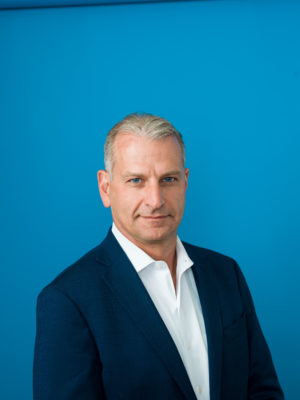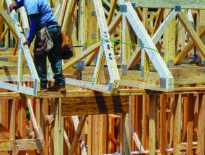Mark Deschenes
President, Boylston Properties
Age: 54
Industry experience: 30 years
Boylston Properties’ real estate investment strategy is as steeped in Greater Boston as its name, and it has no plans to divert from its traditional course under new leadership. The Boston-based firm continues the final stages of its over-1 million-square-foot Arsenal Yards development in Watertown, bringing life science, multifamily housing and new retailers including Roche Bros. supermarket to the former Arsenal Mall property. Upcoming openings at the property this year include Taffer’s Tavern, Central Rock Gym, F45 Training and Pokeworks.
Mark Deschenes was named the Boston-based developer’s new president in late spring, after working alongside Founding Principal Bill McQuillan for nearly two decades. Deschenes’ resume includes development projects such as the Cambridgeport Bank headquarters in Brighton, the Residence Inn Fenway, LINX lab building in Watertown and Arsenal Yards.
Q: What is Boylston Properties’ growth strategy and geographic focus today?
A: Boylston Properties has always had a very parochial view of real estate. We’ve always been very Boston-centric, so our focus has been staying within the Route 128 area for the most part. We’ve been active in retail, hotel, office and labs, and we’ve touched upon many asset types, versus developers that focus on a particular product type. We’re still looking to stay relatively local, and that will continue to be our business.
Q: What’s your outlook for the future feasibility of hotel construction in the COVID era?
A: We are considering hotel opportunities in the future and it depends upon what the market is and the demand drivers in the market, and upon all the other competition there is. But I do think local to the Boston market, and the inner Boston suburbs, the cycle is a little bit different. The urban markets tend to bounce back quicker, but with so much driven by office and retail, the downtown market is much quieter and more focused on the luxury markets.
Our Fenway hotel [a Residence Inn by Marriott] attracts a more transient guest and has recovered quicker than our hotel in the North End [the Onyx], which was more dependent upon the business traveler. That hasn’t recovered as strongly. One other data point I can give you is our Hampton Inn which we built in Watertown. It has a very interesting business mix and gets a fair amount of business from the colleges and seasonal demand for move-ins and graduations.
Q: How does the firm capitalize its developments?
A: We capitalize our projects individually. For the most part, we’ve had a very good group of 35 to 40 individual investors: friends and family mostly. On the larger projects in Watertown, we partnered with JPMorgan and they’ve been a terrific partner. We’re now on our third project with them in Watertown.
Q: What can visitors to Arsenal Yards expect to see as the major changes coming this year?
A: We have several new retailers who will be starting construction and we will start to finish the core of the Arsenal Yards site in the middle of the project. We’re starting the exterior of 500 Forge [lab building], with an entirely new facade along Arsenal Street, which is the old parking garage, and we think that will make a large visual impact.
Q: Do you have a preference for acquisitions versus ground-up development in the near future?
A: We are looking at both, and I don’t know that it’s as much of an inflation and interest rate issue as it is just reviewing individual opportunities on their face and what makes sense for acquisitions and new development. For the most part, what we’re working on right now is predominantly new developments, and when we look at acquisitions we’re looking primarily at value-add acquisitions, either to be repurposed or redeveloped. Our most recently completed project is Blvd + Bond, which was three buildings and three phases, and we stabilized in April 2022. It was a very quick lease-up. Most of what we do, we build with the intention we’d like to own for an extended period of time. We do trade assets on occasion when the timing is right.
Q: What are the biggest hurdles to multifamily development right now?
A: It is really difficult to acquire land for residential development in Watertown. That said, it’s an important asset type and it makes the mix of uses at Arsenal Yards special. But I still think it’s a long-term problem for our industry: to be able to produce enough housing units to make them affordable. We have a housing problem and we need to be able to create more units, but unfortunately they have to be financially feasible. As successful as lab development has been, there’s tremendous opportunities in residential development, but to the extent that it has to compete with life science that makes it a challenge. Interest rates and inflationary pressures add more challenges, but the demand [for housing] is strong.
Deschenes’ Five Favorite Bourbons
- Widow Jane 10-Year
- Bardstown – Phifer Pavitt
- Michters 10-year
- Yellowstone
- Basil Hayden






